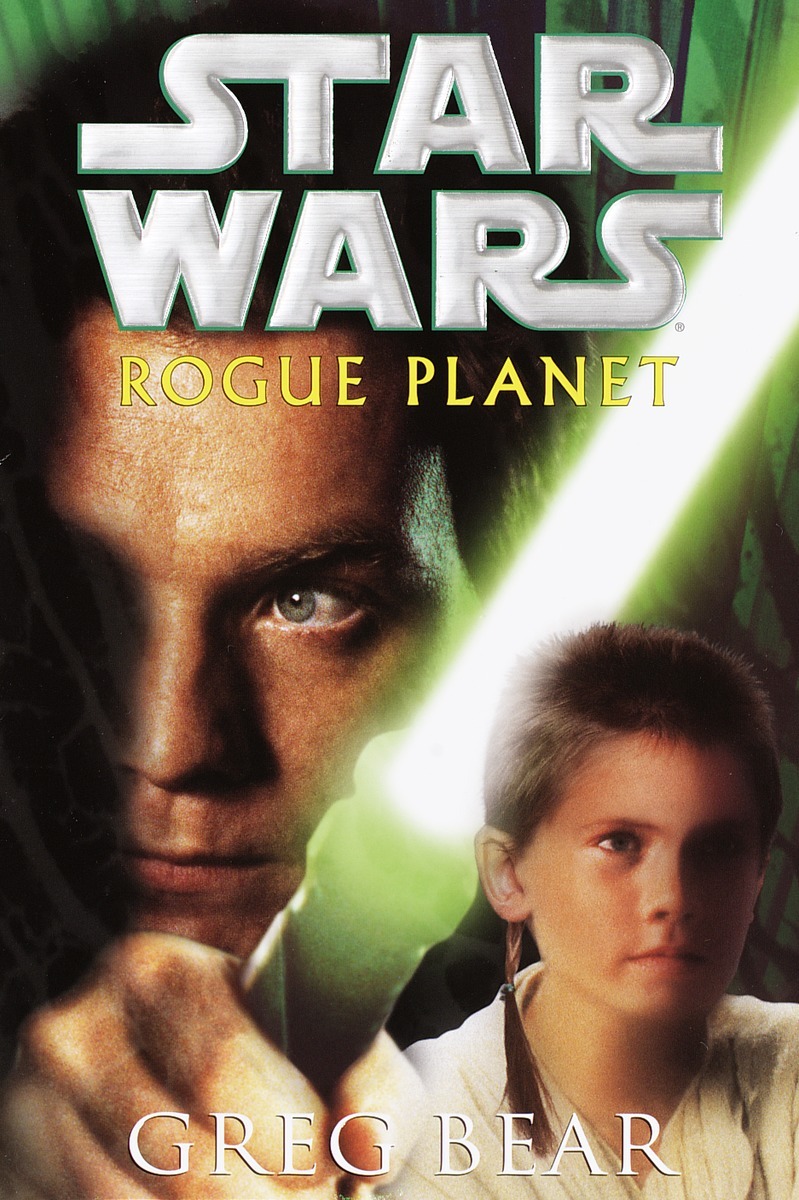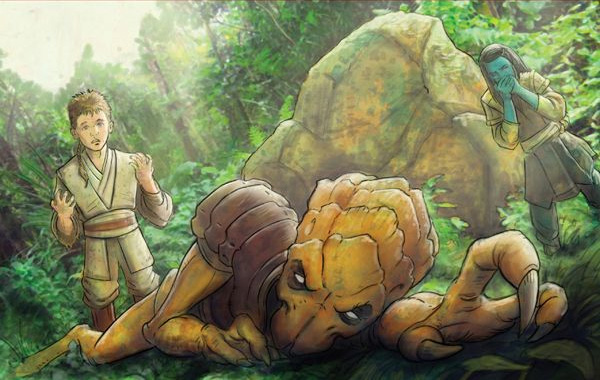
There are very few Star Wars books that really hold up as great works of art. Many are great genre entertainment, fun and excellent by the standards of tie-in fiction or pulp space opera adventure. But few are the kind you’d care to show a snooty friend to make the case for the literary merit of the Expanded Universe. One of the few novels to pass that bar is Rogue Planet, written by multiple Hugo and Nebula Award-winner Greg Bear, and that’s why Rogue Planet belongs among Top Shelf’s collection of the best of the EU.
When I speak of literary quality, I don’t mean that Rogue Planet is comparable with Hemingway. Rather, that it examines deep themes with maturity and sports excellent characterization and prose. It is a serious, rewarding portrait of Anakin and Obi-Wan’s relationship that explores ideas about life, morality, and responsibility in a grand, mystical science-fiction setting.
At the core of the book is the relationship between Obi-Wan and Anakin. The first source to show them as Master and Padawan, it remains the best. Obi-Wan’s perspective is one of the best examinations of parenting in the Expanded Universe. Young, responsibility-saddled Obi-Wan is essentially a new father — worrying that he is not up to the challenge of teaching and disciplining Anakin, worrying that he is in over his head, worrying that he isn’t doing it right. He feels proud of Anakin but also disappointed and exasperated by his headstrong nature. He is critical but loving and protective. His rule-bound, orderly nature is constantly under assault by Anakin’s youthful enthusiasm and hellraising antics, which both excites and annoys him. Most of all, Obi-Wan wants guidance and assurance as he steps into the shoes of his departed mentor, the connection with whom he still misses. This is complicated by Anakin’s insistence that he can hear Qui-Gon speaking to him — why doesn’t Obi-Wan feel the same connection to his Master? What is he doing wrong? Is his whole personality wrong? Is he spiritual enough as a Jedi, or is his connection to the Living Force lacking?
Yet Obi-Wan is not purely a worried father and bereaved apprentice struggling with self-doubt. He is also competent, brave, protective, and gentle as he guides, educates, saves, and forgives his apprentice. In Rogue Planet, Obi-Wan Kenobi is a deeply human Jedi Knight — loving, loyal, and introspective, a profoundly good, if flawed, man struggling to be even better.
The other half of the duo is Anakin. Anakin, extrapolated from The Phantom Menace, has none of the obnoxious whininess and entitlement added by Attack of the Clones. Instead, he is a warm-hearted and open youth, sweet but not quite fitting into the Jedi mold. He is hard to discipline, chasing excitement in underground races, endlessly tinkering with droids, and marching to the beat of his own high-energy twelve-year-old drum. He is questioning and struggles sometimes with Jedi dogma. He seeks emotional connection and buries his confusion, need, and conflict inside.

Anakin’s slide toward the dark side is foreshadowed, but not heavily, and not by turning him into a crappy person rather than a hero. Rather, Bear draws on Anakin’s The Phantom Menace portrayal to highlight his emotional neediness, high-spirited imperviousness to discipline, and struggle with the ascetic monk life without losing sight of the fact that he is a fundamentally kind, good-hearted, idealistic kid who wants to do well. His only dark act is carried out unconsciously, when, unarmed and under threat from an assassin menacing his friend, the girl Jabitha, Anakin’s protective anger bubbles over and suddenly the assassin is dead. It is the act of a child without enough monastic self-control — the “I didn’t mean to!” we’ve all heard from (or said as) a kid who gets in over his or her head. This Anakin — the innocent hellraiser sometimes suppressing a righteous anger — is a far more complex, interesting, and sympathetic protagonist than the whiny, aggressive, warmth-lacking action-adventure asshole seen in the Clone Wars material. This Anakin’s fall would be far more interesting than the one we got.
This is another attraction of the novel — Rogue Planet was the first prequel novel, and as such is one of the most interesting takes on the period in existence, a little glimpse of alternate possibilities. While it fits into the wider prequel EU surprisingly smoothly for a work that jumped into the deep end as a post-Episode I main-character story long before anything could be known of Episode II, it was also fresh enough onto the scene to still be informed by the years of daydreaming speculation about the prequel era before the prequels themselves entirely supplanted that deep well of collective imagination. The much-neglected Wilhuff Tarkin appears as the villain, a wonderfully malicious study in ambition. He is shown to be in cahoots with shadowy forces, some sort of cabal with ties in the government promising a new order in the future. The modern prequel EU could do with a great deal more of this sort of backroom-cabal New Order intrigue highlighting Palpatine’s moves behind the scenes with the foundations of the Empire, rather than isolating Palpatine to his Lincolnesque public persona and his brute-force command of the Confederation as Darth Sidious.
Furthermore, Bear does a great job of capturing the sense of the end of an era, a golden age’s twilight, as a truly great and ancient civilization, an empire of peace, slowly withers from inside with corruption, economic recession, and blithe stagnation. It is a portrayal of the Republic’s slide to Empire that is simultaneously more poetically beautiful on the surface and more disconcerting underneath than we see these days. Contributing to this is the fantastic character of Raith Sienar — an aristocratic, increasingly paranoid genius starship designer enlisted by his friend Tarkin to lead a mission to Zonama Sekot, only to find the mission — and the changing galaxy — not what he had expected.

Somehow, I’ve managed not to speak about Zonama Sekot until the end, even though it’s the core of the book’s plot and theme. Zonama Sekot is the titular rogue planet, a mystery world producing rare, top-of-the-line living spaceships which Obi-Wan and Anakin are sent to investigate, posing as wealthy buyers. Tarkin, meanwhile, sends Sienar after them with an expeditionary force meant to secure the extraordinary technology of the planet. Obi-Wan and Anakin spend much of the book on Zonama Sekot, coming to understand its interdependent biosphere and its refugee settlers, who follow an unorthodox philosophy of the Force. Bear uses this journey into the unknown and, as they discover the secrets of Zonama Sekot, mystical encounter with an extraordinary beauty larger than themselves to study Obi-Wan and Anakin and also to explore the mysticism of the Force and the Jedi’s relationship with it. Lightness, darkness, fatherhood, the changing times, all come to a head in the otherworldly, grandiose setting of Zonama Sekot.
The extent to which Rogue Planet is an introspective, meditative spiritual and relational journey into understanding, rather than a pulpy action-adventure (though there is its share of thrilling action and intrigue) has caused it to come under frequent criticism as boring. That couldn’t be less true. Rogue Planet is gripping precisely because it is a thoughtful, beautiful science-fiction novel exploring grand ideas and relatable themes. It is a real work of art that reaches for something higher even as it entertains Star Wars readers. Rogue Planet deserves much more respect than it gets, and anyone looking for artful Star Wars stories, or seeking to explore the best the prequel era has to offer, should be looking into Greg Bear’s great book.

I agree. I thought it was a lovely book and I don’t understand the hate it gets. It is one of the better Star Wars books out there IMO.
[quote]or seeking to explore the best the prequel era has to offer[/quote]
Imho they should still go for Cloak of Deception there 😉